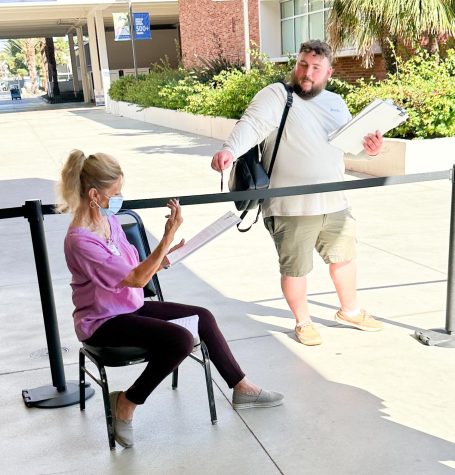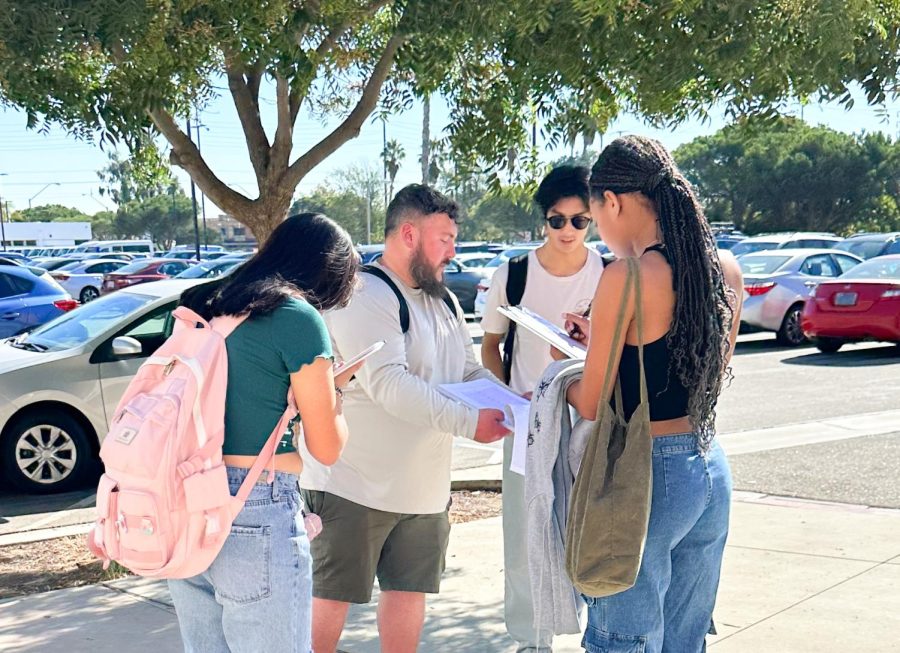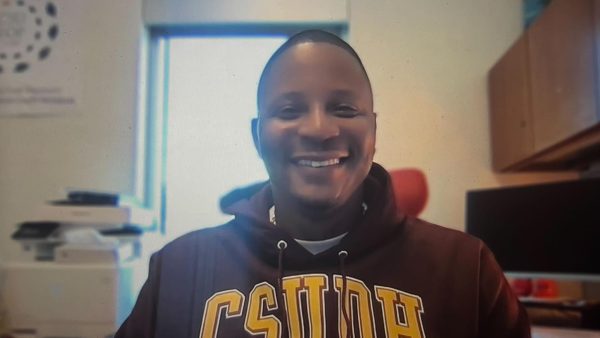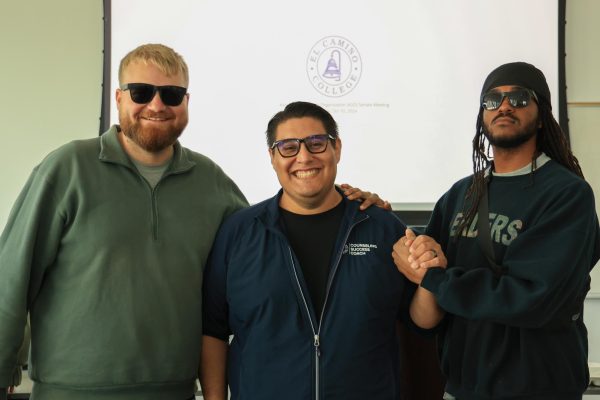Political signature gatherers violate campus policy
Adam Jaor obtains signatures from El Camino College students near parking lot J, on Wednesday, Oct. 19. Jaor, chief executive officer of Freeline Marketing and Consulting, said that he has six to seven petitioners who go around asking for signatures. (Eddy Cermeno | The Union)
19-year-old nursing major Balen Pena walked down a long hallway on the third floor of the Math Business and Allied Health Building.
She kept walking until she got to the last classroom at the end of the hallway.
Checking her phone, she noticed she still had a few more minutes before class.
Taking a seat on a metal bench, she waited for her class to begin.
“Excuse me, can you sign this?”
Pena looked up to see a woman with a pen and clipboard motioning her to sign a paper.
The woman was a petitioner.
Pena skimmed the form, grabbed the pen and paper and signed her name. She included her phone number and address on the paper before giving the form back.
Taking back her signatures the petitioner continued to make her way through the building, all while asking other students to sign.
Petitioners have grown more assertive in how they approach students across El Camino College, interrupting conversations and even roaming inside campus buildings to obtain signatures for petitions.
“I’m giving them my name and my signature and address there,” Pena said shaking her head.
Pena said she felt a “little weird” after being told that petitioners were not allowed inside campus buildings, according to state and college regulations.

Title V of the California Code of Regulations, an official compilation and publication of state regulations, clarifies that solicitation must be localized so it doesn’t disrupt the orderly operation of the college managed by the campus president.
El Camino’s Administrative Procedure 3900 Speech: Time, Place, and Manner, states that no person may engage in the circulation of petitions, leaflets, and other printed matter in areas “within 25 feet of doorways opening to outdoor areas of campus” and “all indoor facilities.”
“They can’t set up shop like right in front of the library or, you know, they can’t block entrances,” El Camino Police Sergeant Ruben Lopez said. “They can’t do it inside the buildings because that’s gonna start inhibiting the student learning.”
Lopez said that if petitioners do not follow the campus restrictions, the police will try to get them to voluntarily comply.
“We normally get some complaints from people,” Lopez said. “[Students] are not too sure about what people are asking for.”
Lopez said that sometimes petitioners do not do a good job of explaining what the petition is about or what the goal is, which leads to students not knowing what they are signing.
Adam Jaor, chief executive officer of Freeline Marketing and Consulting, told The Union that he has six to seven petitioners who ask students for signatures.
Jaor said that he and his company have been to 20 different states, where depending on the state, they stay anywhere from two days or six to eight months.
Regarding some recent reports of petitioners going into El Camino College buildings, Jaor said there is only so much he can do with individual petitioners who do their own thing.
“I tell them to stay outside and keep their distance from people until they want to sign,” Jaor said.
Some petitioners’ wages are earned per the number of signatures they obtain, the number of hours they work and the number of houses they go to ask for signatures.
“I signed a form stating that fast food employees should get paid $22 an hour,” biology major Angel Alcazar, 18, said. “I started seeing TikToks about people talking about that same petition and did some research on my own.”
Alcazar said that he should not have signed the petition because he found out that businesses can close down due to not gaining any profit or not being able to afford their own employees.
Bookstore assistant director Andrew Nasatir said that commercial solicitation is tightly regulated on the campus because it promotes businesses, makes the company profits and generates income from themselves.
“The campus can regulate where free speech can happen,” Nasatir said.
Because petitioners can also get paid per the number of signatures they receive it incentives them to push as many students and employees as possible to sign.
“It is an incentive that [petitioners] get paid,” Nasatir said.
Business administration major Desiree Martinez,19, said that it is “misleading” getting signatures inside the building when they are not allowed in.
“I personally don’t feel comfortable providing my information to strangers,” Martinez said. “I won’t be participating in signing anymore.”
Editor’s Note: Updated feature image on Wednesday, Oct. 19, 2022, at 4:23 p.m.








